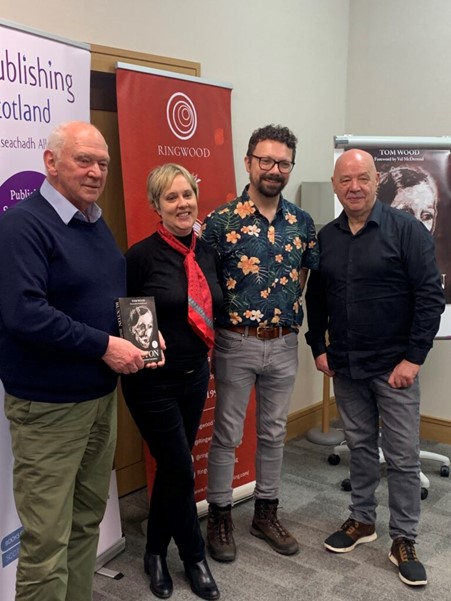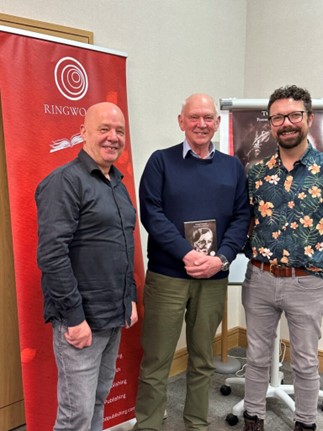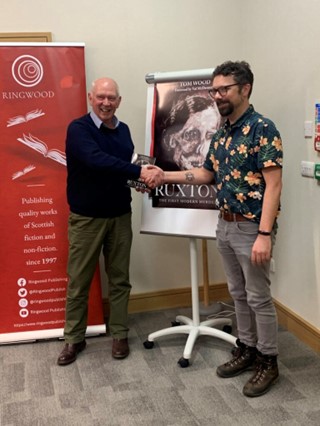Words by Felicity Primrose. Edited by Hayley Bannon.
Fact is Stranger Than Fiction. Veteran investigative officer and Ruxton: The First Modern Murder author Tom Wood discusses Agatha Christie, forensics, and the audiobook process.
It has been an exciting year at Ringwood HQ launching our thrilling new titles and debuting our first audiobook Ruxton: The First Modern Murder. We sat down with author Tom Wood to chat about his bestselling book, the fascination behind the case and finding the right narrator to do the new audiobook justice.
Why did you decide to write about the Ruxton murders — what was it that drew your attention to this particular case?
I spent my whole working life in criminal investigations, and I knew all about the Ruxton murders, being such a famous historic and forensic case. When was I handed a bundle of old papers which had been found in the attic of an old policeman’s house when he died, I thought I knew all about them, but what I read was that there had been a whole other aspect of the case, and this intrigued me; and this was the stories of the people involved. Most important for me were the characters who emerged from this case, many of whom, for some reason, had been written out of the history and it was that which intrigued me. I thought that this wasn’t right and wanted to redress it by drawing people into the light; especially Sergeant Bob Sloan, the sergeant at Dumfriesshire who attended the scene of the recovery of the body parts and who did such a fantastic job. I appreciated that because I had been in that position myself, and therefore wanted to bring more recognition to Bob Sloan and others, so I decided to write a book.
In any true crime case, fact is a lot stranger than fiction. Agatha Christie was fascinated by the Ruxton case, it was stranger than her work. That was also why there was so much interest at the time, it was so uniquely brutal.
Was it difficult to locate and collate the various documents and materials during the process of writing this book?
Once you start looking into a case like the Ruxton murders, you find that there are thousands of documents out there, some of which are complete nonsense. There were a lot of fanciful accounts surrounding the case, and so sorting the truth from the fiction and the tabloid accounts was quite difficult. Eventually I managed to source the complete transcript of the trial, and the telephone messages. Having these was like hearing the voices of the people who were there. I gathered around one and a half, to two million words. The dilemma of course, for anyone writing true crime, is how do I boil this down? I was very conscious of the fact that what I, as a retired investigator, found interesting might not necessarily entertain the wider public. It was often difficult and time consuming; I spent a year researching the case and another year writing it. History is usually written from a particular point of view but there is always another point of view. There are many stories, I find, that once you dig into them you see that they are not complete — Ruxton is an example of this. My research was much, much easier now that we have the internet, everything is so much more available now; Edinburgh University’s Department of Anatomy was also very helpful throughout my research process.
How did your background with the police aid you in writing the novel? Do you think your expertise was relevant when analysing the investigative process?
It was absolutely crucial, I couldn’t have written the book in the way I have without the experience I’ve had. It gave me a unique insight as I could place myself in that situation because of similar crime scenes I have been involved with. I could sense the tension and the rising pressure to identify the bodies and get the suspect. Having studied criminology and sadly, having met a few murderers in my time, I also knew what was going through the mind of Ruxton himself: the rage, this crime of passion, then the cooling down and deliberate attempt to escape justice. Some people have said I compliment Ruxton too much in this book but I don’t think that’s true. I know exactly the pressures that are on people who have committed these terrible crimes: most of them can’t handle it and run, leaving behind a trail of evidence. Ruxton, in the three or four days after, did well in covering his tracks. He made some mistakes, crucial mistakes, but overall, from a professional point of view, he did pretty well. My experience was absolutely crucial in writing the book. If I had been there at the time I hope I would have done half as well as Bob Sloan and the other policemen on the case.
How would you say forensics and criminal investigations in the modern day have been shaped by the Ruxton investigation, directly or indirectly?
One of the things which came from this case was just how influential the Ruxton investigation was on modern police and forensic practice. The book is subtitled The First Modern Murder because it really was the first murder where forensic science and police investigation were intertwined in that way. Even the main characters, forensic scientists Glaister and Sydney Smith, said themselves that they had never worked so well, so closely and in such a harmonious way with the police service as they had in the Ruxton case. It served as the model I inherited as a young detective in the 1970’s. You accept these procedures as what has always been, but they had in fact started with the Ruxton case. It was hugely influential, and I think it established the model of the modern independent forensic expert that we see today. Glaister and Smith were the prototypes of that, by being absolutely objective, independent, and fair-minded.
One of the things which came from this case was just how influential the Ruxton investigation was on modern police and forensic practice. The book is subtitled The First Modern Murder because it really was the first murder where forensic science and police investigation were intertwined in that way. Even the main characters, forensic scientists Glaister and Sydney Smith, said themselves that they had never worked so well, so closely and in such a harmonious way with the police service as they had in the Ruxton case. It served as the model I inherited as a young detective in the 1970’s. You accept these procedures as what has always been, but they had in fact started with the Ruxton case. It was hugely influential, and I think it established the model of the modern independent forensic expert that we see today. Glaister and Smith were the prototypes of that, by being absolutely objective, independent, and fair-minded. Furthermore, they were forensic investigators as well as scientists. They could not only analyse but interpret what the science meant in relation to the crime.
What were your favourite and least favourite parts about the process of writing a true crime account?
My favourite part was telling the story, writing about the characters, and bringing them out in primary colour. These fantastic men had survived the First World War and been marked very heavily by it, rose so magnificently to this case. I admired them tremendously. When you write these things you would like to have met these people. I didn’t enjoy endless fact checking and editing over and over again, which of course everybody has to do — you start to miss obvious mistakes in your own writing. That part was probably the least enjoyable, but also the most necessary. I think that for young writers starting out, particularly for those wanting to go down the road in self-publishing, having a good editor is absolutely essential.
Earlier this year Ruxton was turned into Ringwood’s first audiobook, congratulations on that achievement. How did you feel when you found out that Ruxton had not only been put forward for the audiobook grant, but also won it? (One of five grant winners).
I was delighted — I’d always had it in my head that Ruxton would be an audiobook and I also had in my head a narrator, a voice. I think one of the things I do when I’m writing is that I try to write conversationally – I write as I speak. When I’m reviewing a chapter, I’ll read it aloud to myself. I also have this inner voice so if it doesn’t run like a narrative then, to me, it isn’t right. I was really delighted that Ringwood put Ruxton forward. It was a super idea from Publishing Scotland to hold this competition and I hope they can do it again in future. It’s absolutely great and of course, audiobooks are very very popular now, as are podcasts, so I was delighted when it was successful! And again, I was very pleased that Publishing Scotland had confidence in the book, and that Ringwood had supported it.
The project was funded by Publishing Scotland and recorded by Offbeat Studios — how did those relationships build over the audiobook process?
Publishing Scotland were super to deal with, as were Offbeat Studios. I thoroughly enjoyed the process and how involved I was, especially visiting the studio and seeing the technical expertise behind the scenes. There is this idea that audiobooks are simply somebody reading a book aloud, but it’s actually incredibly complicated, technically and professionally. I was hugely impressed by both the studios and by Steve, the narrator. To me, it was learning something completely new. The whole book, the finished product, is nine hours of reading. But of course, the process of getting nine hours of edited material takes triple or quadruple the amount of time. After thorough editing it was sent to me for approval, then for final comments and edits. The process is like making a film, only in audio — you don’t do it in just one shot.
We were very lucky as it was a very worthwhile grant from Publishing Scotland. We had a launch meeting with them; they have huge publishing expertise and have been extremely helpful in the process. I really hope it can be continued for other people. It’s been a great experience for Ringwood too by producing their first audiobook. This was a great insight into what it takes to create an audiobook.
The process is like making a film, only in audio — you don’t do it in just one shot.

Ruxton author Tom Wood with Vikki Reilly from Publishing Scotland, audiobook narrator Steve Worsley and Iain McKinna from Offbeat Studios
What was the selection process for a narrator like — what were you looking for in a narrator and what was it about Steve Worsley that made you pick him against the other candidates?
Offbeat Studios have a bank of voices and I was sent a variety to choose from, all of which read a chapter from Ruxton. I wanted the sergeant down in Dumfriesshire to tell the story so I knew the kind of voice he would have and Steve was the perfect fit. He can put on several voices and inflections but there was one voice which he did which made me decide straight away that this was the one. Not only does Steve have a great voice, but he is also a great person to tell this story.
True crime is a very popular genre both in print and audiobooks — what do you think are the main benefits of print versus audio and did you discover any differences between the two?
There is something nice and tangible about having a physical book, and I don’t think that will ever be replaced. But at the same time, many people now read on devices and listen to audiobooks and podcasts on journeys. There’s definitely space for both.
I believe that book reviews are very important, and you can learn a lot from them. If you’re a writer then it’s all about continuous improvement, it’s about honing your skills, practising, trying to make things better, and reviews are hugely important in this process.
There are some exciting plans in the works for Ruxton — what are these and what are you most looking forward to?
The first thing is that there’s exciting things happening with Ruxton in that the rights for a podcast and hopefully TV and film have been bought by an American company who I have been working very closely with. They are based in Portland, Oregon and California and are the people behind the very successful American podcast Small Town Dicks. I have been working with them on the podcast, which I hope will be out in October 2023. I’ve done some programmes with the podcasters already, but they are treating Ruxton differently. It’ll be a six part project with lots of different voices coming in. It will be narrated by Yardley Smith who is very well known in film and television, notably as the voice of Lisa Simpson from The Simpsons. The process of recording a podcast is great, it’s very conversational and extremely enjoyable. They are all very professional people who I much enjoyed working with. I hope thereafter, that the podcast will be a springboard to the story being turned into a television docu-drama.
In terms of my future, I have two more books planned; one hopefully will be out at the beginning of next year and that is a collection of true crime stories, all true crime and true characters. I have another one planned for 2024, titled The Worst of Times about three serial killers in Scotland in the 1980s and ‘90s. In any true crime case, fact is a lot stranger than fiction. Agatha Christie was fascinated by the Ruxton case, it was stranger than her work. That was also why there was so much interest at the time, it was so uniquely brutal.

Iain McKinna with Tom Wood and Steve Worsley
Tom Wood and Steve Worsley

